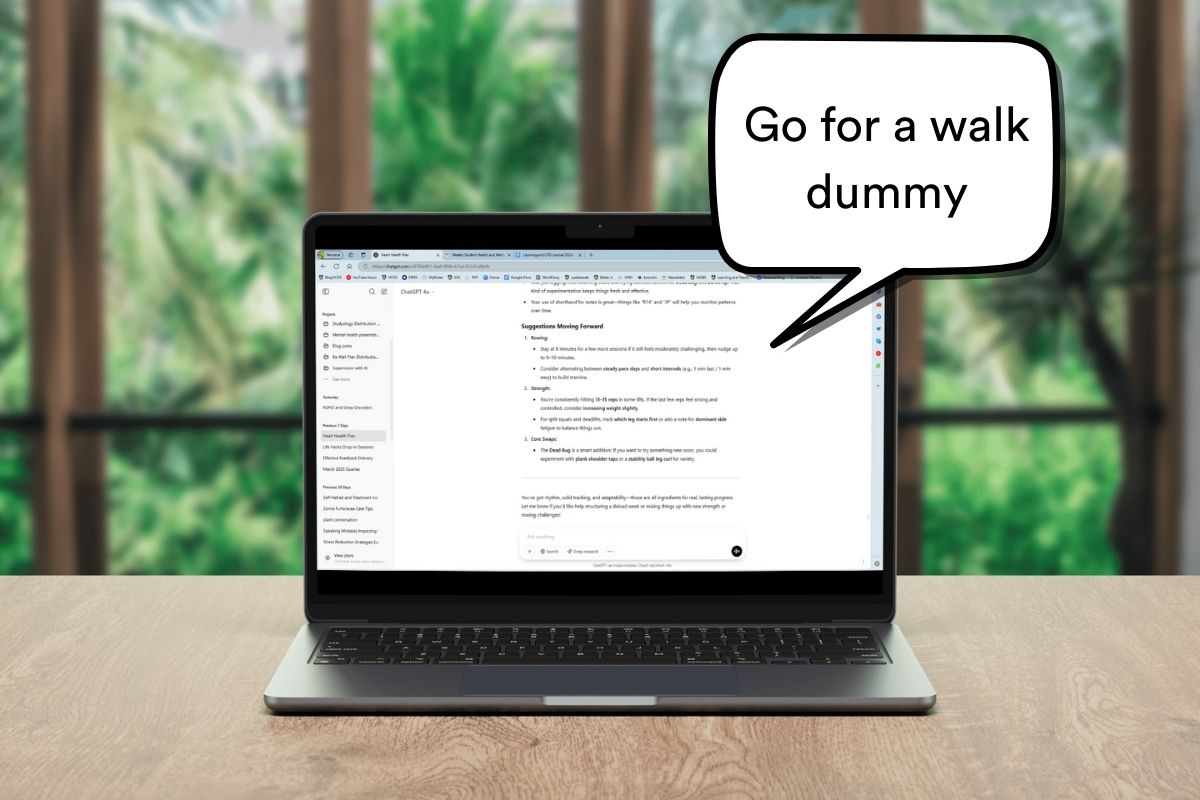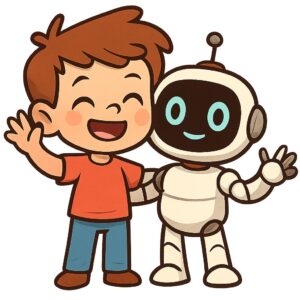
Will my use of AI as a personal trainer, nutritionist, learning partner, and reflection tool come to a horrible end? Possibly, but for now, it’s going OK.
The conversation around Artificial Intelligence (AI), especially in academic circles where we all are, often centres on its implications for learning and work. And the implications are huge, significantly impacting how we research, teach, and operate. While I certainly find AI valuable professionally (it helped me write this), what’s been perhaps a slow burning realisation is that it might be really useful in my personal development journey.
I’m a chatGPT Plus user (and recently trialling Gemini Advanced) and about a year into using it for work stuff, I started asking it more personal questions. Slowly, over time, I realised it was helping me on a number of fronts. Here’s a glimpse into how I’m currently using AI for personal growth:
1. My AI Fitness & Health Coach:
- 💪 Workout Design: After a long hiatus from resistance training, this year I picked it up (excuse the pun) again. I’ve been using AI to help design weight training routines, specifying exercises, sets, and reps tailored to my goals. It’s like having a basic personal trainer on demand. It is able to construct routines knowing what equipment I have at home. It can easily suggest alternative exercises when I want to mix up a routine.
- 📈 Progress Motivation: Perhaps unconventionally, I started sharing progress photos (like workout records) with AI. Making your progress visible is a key behaviour change technique, so my goal initially in sharing it was to simply reinforce my collecting of that data. But AI turned out to be an excellent cheerleader, noting the specific improvement areas, giving lots of positive feedback, and giving genuinely helpful tips for future mods of my workouts.
- ♥❤ Heart-Healthy Eating: Following advice from my cardiologist to focus on heart health (yes, I am old and fat enough to have a cardiologist), AI has become my go-to for generating heart-healthy recipes and meal ideas. It can even easily take into account all my food neuroses (I’ve collected quite a few).
2. My AI Learning & Reflection Partner:
- 📚 Synthesising My Learning Journal: As a psychologist, ongoing learning and reflection are crucial for maintaining registration (we call it Continuing Professional Development, or CPD). I use AI to help synthesise notes from past learning, set clear future learning goals, and even develop systems for summarising my CPD activities effectively. This is particularly important because I keep quite detailed learning journals which can be 40000+ words.
- 🤔 Simulating Supervision: In psychology, supervision is a cornerstone of professional practice. I’ve experimented with using AI to act like a supervisor – prompting reflection on my projects and helping detect key themes in my work and suggesting areas for future skill development. One of the features of modern AI systems like chatGPT is to give them instructions on how you want them to respond. In this case, I ask it specifically to act like a psychology supervisor. It doesn’t replace human supervision, but it’s a fascinating supplementary tool for self-reflection.
- ✍ Journaling Prompts: When I need structure for my personal journaling (which I do in the evenings), AI helps propose outlines, based on evidence-based writing exercises. For example, it recently gave me the GLOW framework – gratitude, learning, opportunities, ways forward – which I am using for the next couple of weeks to focus my reflections. Once I have exhausted that format, I’m sure it will be able to give me another format to guide my journaling adventures.
- ✂ 📰 Content Summarisation: I often use AI to create concise summaries of relevant lectures or seminars available online (like on YouTube). This not only aids my own understanding but also allows me to easily share key insights with a community of mental health professionals I’m part of. We don’t always have 60 minutes to set aside to watch a full lecture, but we might be keen for some of the insights shared in that lecture.
Novelty or Lasting Value?
I’m certainly still exploring, and I suspect I’ve only scratched the surface of AI’s potential for personal development. There’s undoubtedly a novelty factor to having a ‘wise’ companion for input, and I do wonder if these specific uses will continue indefinitely.
That said, the process of being curious, experimenting, and seeing tangible benefits – a new workout plan, a helpful recipe, a structured way to reflect – has been genuinely rewarding so far. It’s provided a practical context for engaging with this technology in a way that feels like it might improve my quality of life.
Of course, I’ve felt optimistic about other technological developments initially (hello, email and social media!), only to abandon them or at least try to reduce their hold on my life because they ultimately detracted from my life rather than adding to it. So, for AI, time will tell.
Perhaps the most valuable takeaway for now is this: while the big debates about AI in education and industry rage on, personal exploration can help you decide what role, if any, these tools might play in your life. If personal growth is on your agenda, could AI be a useful companion? Is it already?


